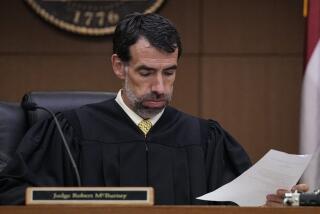Lithuania Referendum Held Invalid : Baltics: Gorbachev decrees that the upcoming vote on independence will have no legal standing. He seeks a later countrywide ballot on federation.
- Share via
MOSCOW — Soviet President Mikhail S. Gorbachev on Tuesday nullified the referendum that Lithuania plans to hold this weekend on independence for the Baltic republic and accused Lithuanian leaders of using the poll only to marshal support for “their separatist aspirations.”
Gorbachev, asserting that Lithuanian officials were violating the new Soviet law on referendums, said in a presidential decree that the results of the poll on Saturday will have no legal standing.
But Gorbachev gave no indication that the central government would attempt to halt the voting, for which absentee ballots are already being cast. Last month, Soviet troops were used in Lithuania to seize the television broadcast center, resulting in the deaths of 14 people, and soldiers remain deployed there.
A top official of the Soviet Interior Ministry told Western correspondents later Tuesday that the central government would argue that the voting is “just an opinion poll, not a referendum according to law” and then “try first of all to convince people they should not act in such a way.”
Lithuanian President Vytautas Landsbergis, who has led the republic’s struggle to regain the independence it had before World War II, denounced Gorbachev’s decree as “impermissible interference in the affairs of the sovereign Lithuanian state” and declared that the referendum would proceed.
“The Republic of Lithuania has re-established democracy based on the free expression of the people’s choice through elections, plebiscites and other means,” Landsbergis said.
Voters will be asked, “Do you agree that the Lithuanian state should be an independent, democratic republic?”
Lithuanian officials are confidently forecasting a “yes” vote of at least 85%, and they have planned to use the results to press the republic’s drive to secede from the Soviet Union.
In declaring the Lithuanian plebiscite invalid in advance, however, Gorbachev underscored his determination to take the whole country to the polls next month in his own referendum on whether the Soviet Union should be reconstituted as a federal state.
Gorbachev said that the Lithuanian vote “cannot be regarded except as intended to block enactment in the republic of the Soviet parliament’s resolution on holding a (countrywide) referendum.” Other republics, however, have also scheduled their own polls, putting questions before the voters that emphasize independence and not the continued federation that Gorbachev wants.
With the mandate that he expects to receive in the countrywide referendum March 17, Gorbachev plans to press those republics that intend to remain part of the country to sign a new “union treaty,” which he says would lay the basis for further political and economic reforms.
Those republics that want independence--presumably Lithuania and neighboring Latvia and Estonia, probably the southern republic of Georgia and perhaps others--would then be required to follow Soviet law to secede, including lengthy negotiations with the central government and possibly further referendums.
The Soviet Union on Tuesday told the international community again that developments under way in the Baltics are its internal affair and warned that it would not tolerate what it regards as interference.
Iceland’s ambassador, Olafur Egilsson, was summoned to the foreign ministry and told that his country’s recent steps toward establishing diplomatic relations with Lithuania were unacceptable to Moscow and, in fact, were only fanning tensions.
“The political dispute between the Baltic republics and the Soviet authorities may not be settled on the basis of international law,” Vitaly I. Churkin, the foreign ministry’s chief spokesman, said, conveying Moscow’s increasing irritation over international comment on the dispute.
“Attempts to draw United Nations bodies or the entire U.N. into a settlement of this domestic issue of the Soviet Union have no grounds, will be appropriately assessed and, if necessary, rebuffed. The same is true of plans to misuse normal parliamentary and other relations to fan up tensions from outside,” Churkin said.
More to Read
Sign up for Essential California
The most important California stories and recommendations in your inbox every morning.
You may occasionally receive promotional content from the Los Angeles Times.










